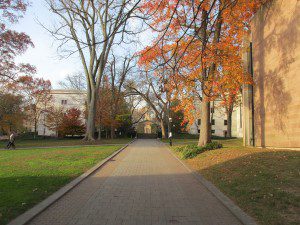 The biography of the conference’s keynote speaker, Robby George, who spoke in Union’s chapel service:
The biography of the conference’s keynote speaker, Robby George, who spoke in Union’s chapel service:
Professor George is a member of the President’s Council on Bioethics and formerly served as a presidential appointee to the United States Commission on Civil Rights. He was Judicial Fellow at the Supreme Court of the United States, where he received the Justice Tom C. Clark Award.
He is the author of In Defense of Natural Law, Making Men Moral: Civil Liberties and Public Morality, and The Clash of Orthodoxies: Law,  Religion and Morality in Crisis. He has published numerous scholarly articles and book reviews. Professor George is a recipient of many honors and awards, including a 2005 Bradley Prize for Intellectual and Civic Achievement and the Stanley Kelley, Jr. Teaching Award from Princeton’s Department of Politics. He holds honorary doctorates of law, ethics, letters, science and humane letters and is the Director of the James Madison Program in American Ideals and Institutions at Princeton.
Religion and Morality in Crisis. He has published numerous scholarly articles and book reviews. Professor George is a recipient of many honors and awards, including a 2005 Bradley Prize for Intellectual and Civic Achievement and the Stanley Kelley, Jr. Teaching Award from Princeton’s Department of Politics. He holds honorary doctorates of law, ethics, letters, science and humane letters and is the Director of the James Madison Program in American Ideals and Institutions at Princeton.
The following is an edited summary of George’s chapel message.
George began with a discussion of goods: we have a friend, we are a friend, we pursue knowledge as ends unto themselves. No one would be much of a friend if one only did so to get something out of it. No, friendship is intrinsically valuable. It is also distinct from other goods. Human good is variegated. What distinguishes morality from other goods?
We should will what is good for persons in its fullness and completeness. Our obligation is to love and respect persons. Many of our choices are not between moral and immoral choices, but between two or more moral choices. They are between good and good. We are finite creatures.
Norms of morality require us to live lives with coherence. This can take many forms. One can be an insurance worker, watch football, and coach Little League. One can be a pastor, not watch television, and teach church history at the local seminary. These are both morally acceptable but mutually exclusive opportunities.
Persons face these questions whether or not they are men or women of faith. Some people think that utiltarianism will lead them to the right option; they try to quantify what can’t be quantified. There is no such ultimate measurement, however. This makes moral judgment a matter of math, of quantification.
A Christian, however, will not regard himself as on his own in matters of moral reflection. A Christian presupposes that God has a plan for him. Catholics call this a vocation and believe that everyone has one. Some think that only religious workers serve God, but this is not right. Everyone’s work has secular dimensions. Our challenge is how to serve God with our gifts. Faith is at the center of figuring out what we should do. How can we maximize our talents for God instead of merely making money, or getting “satisfaction,” or some other end. God attaches responsibilities to our gifts. Our lives will hang together if we live out this sort of life.
God gives us reason so that we can honor the Lord. This is the natural law, the law “written on our hearts” (Romans 1). The Christian believer in natural law also believes that biblical moral norms also clearly apply. Faith allows us to see the cosmic consequences of our actions. This is a kind of participation in Christ’s own work, the work of building God’s kingdom. We look forward to the fullness of this kingdom, which is not yet completed, though already inaugurated.
There is also the biblical call to perfection, involving the call of the Christian to follow Christ in self-sacrificial love. In response to the rich young ruler’s question on what he should do in following the Lord, Christ first told him that he should keep the Ten Commandments. The young man must have been elated to hear this–he had kept these! Then, however, Christ told him that he needed to sell all that he had. This is the vocation of every Christian. This demand is, humanly speaking, impossible. The Christian call, though, is to walk with Christ wherever we may be used. This might mean that we stand against abortion and become culturally marginalized. This might mean that we have to put our prospects for career advancement at risk.
Each of us, if we will be faithful to the gospel, must pray for divine assistance, the grace, to meet his divine call. Being a Christian, a man or a woman of faith, means believing that we are not on our own. The love of Christ empowers and emboldens us to say yes, Lord, in your grace and your awesome power, I will do it.
My Take
Robby George is one of the clearest communicators I’ve ever heard. This is especially noteworthy because he’s often breaking down dense content for his audiences. In this short but moving address, he challenged the Union University student body to do something great for God in a manner consonant with their gifting. He briefly defended natural law theory but spent the bulk of his time drawing the attention of his audience to what one might call a God-centered life. With precise, brisk, finely chosen prose, he exhorted those in attendance to pursue not fame, but faithfulness, not riches, but service to Christ.
I have this said before, but I will say it again. Robby George’s life, from my perspective, authenticates his message. His leadership of the religious conservatives from the elite American academy has, it is true, brought him a certain fame and opportunity. It has also, though, branded him, and has likely cost him dearly in ways one cannot easily quantify. As one who went to a “little Ivy” in Maine, I can say that I know of almost no one like him in the secular Northeast. He is a hero. I don’t mean this in a fawning way. I mean it in the most honest sense. He is courageous, and dogged, and nothing short of heroic. His championing of the pro-life position is a model for young scholars. One can only hope that others will follow in his footsteps who do not shy away from advocating for the helpless, the defenseless, the marginalized, the killed.
From here, we’ll move to our last program, a lunch featuring closing remarks by Hadley Arkes.











